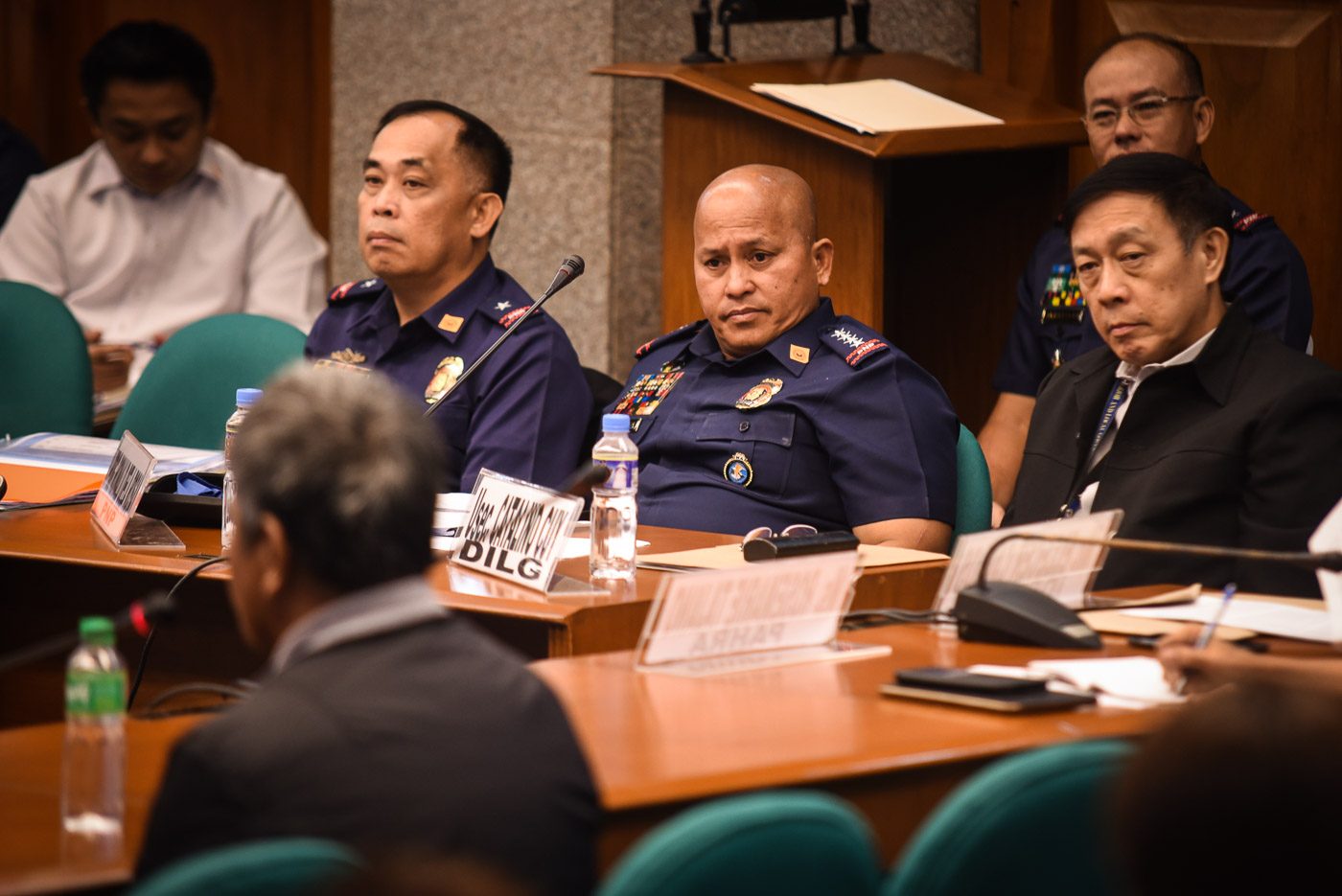SUMMARY
This is AI generated summarization, which may have errors. For context, always refer to the full article.

MANILA, Philippines – Philippine National Police (PNP) chief Director General Ronald dela Rosa on Wednesday, October 5, “vehemently denied” a report that claimed the existence of “police special operations teams” created to “execute” criminals, particularly those linked to illegal drugs.
“For the record I vehemently deny such formation of a hit squad. Kailangan pa ba natin mag-hit squad na p’wede mo namang gamitin ang regular performance duties ng isang ordinaryong pulis para diyan sa drugs? Bakit kailangan pa ng hit squad?” said Dela Rosa in a chance interview.
(Why would you need to form a hit squad when you can use the regular performance duties of a regular cop for anti-illegal drugs operations? Why would you need a hit squad?)
Dela Rosa was reacting to a report by The Guardian that featured a senior police officer who claimed to be “part of one of 10 newly formed and highly secretive police special operations teams, each with 16 members.”
The teams, the cop said, “are coordinated to execute a list of targets: suspected drug users, dealers and criminals.”
The report comes as the police face continued criticism amid the rising death toll in President Rodrigo Duterte’s “war on drugs.” To date, at least 1,381 drug suspects have been killed in police operations since July 1. Police have also arrested more than 22,700 drug suspects as a result of these police operations.
“The killings mostly take place at night, he says, with the officers hooded and dressed in all black. They set their watches, giving themselves one minute or two to extract target individuals from their houses and kill on the spot – swift, precise, no witnesses,” reads the report.
Dela Rosa downplayed the credebility of the senior police official in the report, going so far as tagging him as someone who might have an axe to grind against him.
“Baka mamaya itong opisyal na ito ay galit sa akin o ayaw niyang ‘yung pamamaraan ko sa pag-run sa organization (This official might just be mad at me or he might not agree with the way I run the organization). You cannot please everyone,” said Dela Rosa, who since July has had to defend the PNP from allegations of abuse of power.
Asked if he was going to check the veracity of the claims on The Guardian report, Dela Rosa said he was going to check the source of the claims himself.
“Sasabihin ko sa kanya, ‘yung nagbabalita, na ‘yung balita niya is a hoax. He is inventing his story kung hindi niya sabihin sa akin kung sino ‘yung senior police official na yan,” he said. (I’ll tell the reporter that the report is a hoax. He is inventing his story if he doesn’t tell me who that senior police official is.)
Dela Rosa added: “Sana i-present niya sa akin kung sino ang official na ‘yan. ‘Tsaka ‘yung official na ‘yan na nagsasabi, sana may bayag. Opisyal ka pa naman tapos gano’n ang gagawin mo, sisirain mo ‘yung organisasyon? Ano’ng klaseng official ka? Wala kang bayag.”
(I hope the writer presents to me that official. And the official making those claims, I hope he has balls. You’re an official and that’s what you do, destroy the organization? What kind of official are you? You have no balls.)
Another 2,100 deaths, which are possibly linked to illegal drugs, are “under investigation” by police. Most of these deaths are apparent vigilante-style killings, wherein victims are found in dark alleyways tied, gagged, and accompanied by signs declaring them “drug pushers.”
The rise in the death toll has led some sectors to accuse the Duterte administration of either consenting to, inspiring, or ordering the execution of suspected drug personalities.
Dela Rosa defends the police force by saying those killed in operations are drug suspects who “fought back (nanlaban)” and put cops’ lives in danger.
It’s not the first time a vigilante group has been linked to a Duterte campaign against illegal drugs.
The President, Davao City mayor for over two decades, has long been linked to the so-called Davao Death Squad, a vigilante group that targets suspected criminals in his city in Mindanao. The supposed death squad became the subject of a Senate probe that was initially formed to investigate the rise in killings.
Dela Rosa, who lives in Davao and was Davao City police chief, said the Davao Death Squad is merely a “creation of media.” The Senate, composed mostly of Duterte allies, is investigating the rising death toll related to the drug war, including the police’s supposed hand in summary killings.
Criticism of Duterte’s war on drugs are coming from overseas as well. International human rights organizations, the United States, and the United Nations have expressed concern over the deaths in the drug war.
Duterte has brushed them off, even lashing out at officials who criticize his policies. – Rappler.com
Add a comment
How does this make you feel?
There are no comments yet. Add your comment to start the conversation.